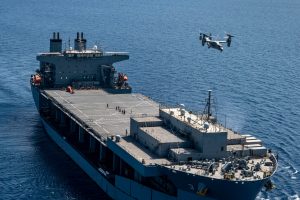Two Navy SEALs still missing
In a daring operation, U.S. Navy SEALs intercepted and seized a large cache of Iranian advanced conventional weapons destined for Houthi forces in Yemen. The operation, conducted on Jan. 11, by U.S. Central Command (CENTCOM) forces, targeted a dhow in international waters off the coast of Somalia.
According to CENTCOM, the seizure included components for ballistic and cruise missiles, such as propulsion systems, guidance modules, and warheads. These components were identified as parts for medium-range ballistic missiles (MRBMs) and anti-ship cruise missiles (ASCMs), as well as air defense equipment. Intelligence analysis suggests these weapons were previously used by Houthi forces to target international merchant ships in the Red Sea.
This interdiction marks the first capture of advanced Iranian-manufactured ballistic missile and cruise missile components by the U.S. Navy since November 2019. It represents a significant violation of U.N. Security Resolution 2216, which prohibits the transfer of weapons to Houthis in Yemen.

The operation involved Navy SEALs from USS Lewis B. Puller (ESB-3), supported by helicopters and unmanned aerial vehicles. It was executed under challenging night-time conditions.
Tragically, two U.S. Navy SEALs involved in the operation were reported missing at sea. Gen. Michael Erik Kurilla, the commander of USCENTCOM, stated that an exhaustive search is underway for the missing personnel.
Post-operation, the dhow was deemed unsafe and sunk by the U.S. Navy. The fate of the 14 dhow crew members is currently being determined in compliance with international law.
Gen. Kurilla emphasized the ongoing nature of Iran’s destabilizing activities in the region, stating, “Iran continues to ship advanced lethal aid to the Houthis, blatantly violating U.N. Security Resolution 2216 and international law. We are committed to working with our regional and international partners to thwart these illegal activities and maintain freedom of navigation.”
This incident underscores the complexities of regional security issues and the ongoing challenge of enforcing international arms embargoes.

